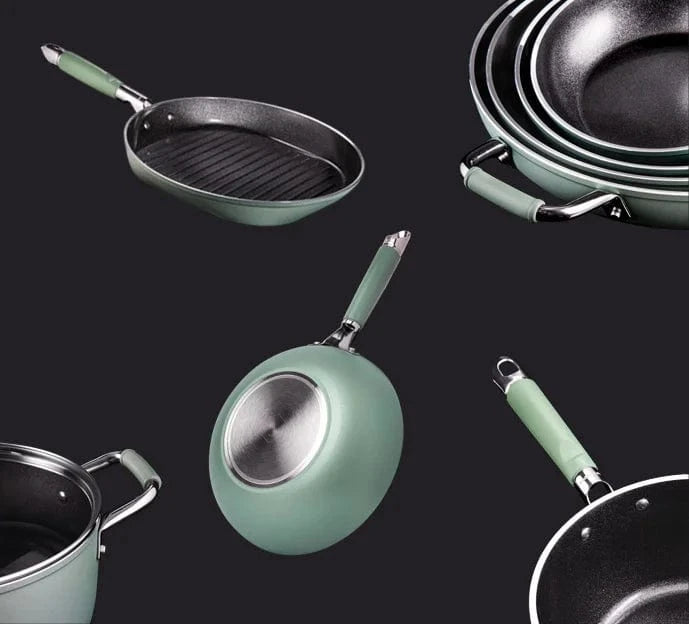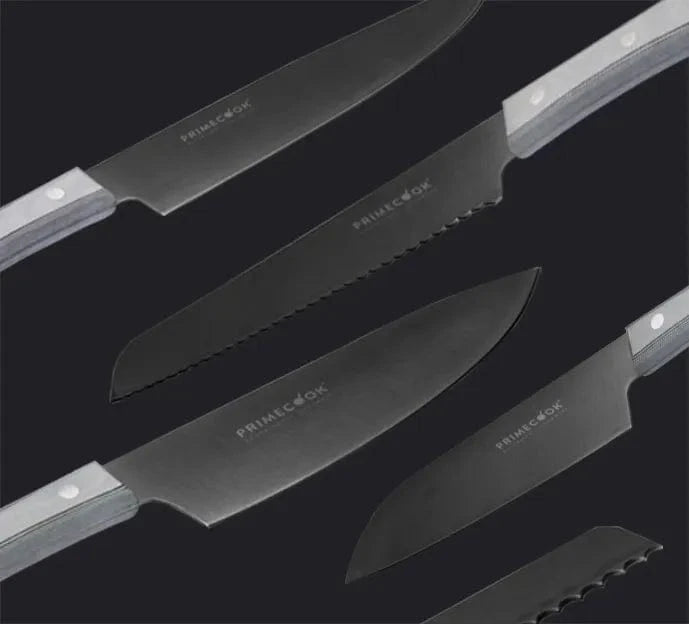We recommend the use of each product exclusively for the purposes for which it was built. Use for other purposes and other types of work can seriously damage the product.
PTFE-free non-stick pots and pans
Use and maintenance of high quality Primecook non-stick pots and pans
Perfect cooking is keep performance high over time of our pots and pans is easy with our tips. And you will be pleased to find that our non-stick pans are much easier to wash compared to the market average: seeing is believing!
First washing pots
Before first use, wash the pot with hot water and a little soap (better if delicate) e dry it with a cloth or absorbent paper. This is because new pans are coated with a normal invisible protective patina which if not removed can lead to rapid damage.
After drying it is necessary oil the pot. With the help of kitchen paper, distribute a little oil evenly over the entire surface, without final rinsing. The procedure goes repeated every 3 - 4 months.
For future uses, we recommend always using a little butter or a drop of oil, so as to keep the non-stick coating perfect for longer.
Cleaning non-stick pans
For proper routine cleaning, after allowing them to cool wash the pots by hand with hot water, dry them with absorbent paper and put them away. If necessary, use a little detergent. We suggest avoiding the dishwasher as the use of aggressive detergents could ruin the non-stick coating.
Primecook high quality cookware maintenance
To ensure long performance and maximum cooking safety avoid the use of abrasive sponges is use only wooden, nylon and silicone utensils. In addition, repeat the phase every 3 - 4 months oiling (see first point).
Knives
For an optimal life of the knives, follow these guidelines:
For all other information visitFAQ area.
- We recommend hand washing with lukewarm water and neutral detergent and drying immediately after each use. This will prevent acidic food residue from affecting the blade.
- Dishwashing is allowed as long as it is done with neutral detergents and dried immediately at the end of the wash cycle.
- Avoid cutting food on hard objects such as glass, metal or stone. NEVER cut frozen food.
- Do not allow the knife to come into contact with abrasive or corrosive materials or substances.
- Avoid using acid (lemon) rinse aids, especially in the presence of chlorine-rich water.
- To avoid overheating, coolant must be used when grinding with grinding wheels. Incorrect sharpening can irreparably compromise the technical characteristics of the knife (loss of the cutting edge, blade breakage, etc.).
Cutting Board
For proper maintenance of the cutting board we recommend:
- Remove superficial stains with a damp cloth, warm water and soap
- Keep the Paperstone® top dry to avoid the formation of streaks and limescale deposits
- Avoid using acidic cleaners, harsh chemicals and bleach
- Do not use abrasive sponges or metal scrapers
- Avoid direct or close contact with heat sources
- Apply the special-purpose Osmo® Liquid Detergent once a year. For more information, ask your local dealer.
Cutting board holder
For proper maintenance of the cutting board holder we recommend:
- Remove superficial stains with a damp cloth and/or soft sponge, warm water and soap
- Do not immerse in running water and do not wash in the dishwasher;
- Avoid using acidic cleaners, harsh chemicals and bleach
- Do not use abrasive sponges or metal scrapers
- Avoid direct or close contact with heat sources
- Do not cut the food on the surface of the cutting board holder.
Magnetic block
For proper maintenance of the magnetic block we recommend:
- Avoid direct or close contact with heat sources
- Do not place or insert dirty knives on the block
- Do not immerse the magnetic block in running water and do not wash in the dishwasher
- Clean with a damp cloth and/or soft sponge, if necessary, with the addition of a mild liquid detergent
- Avoid contact with objects containing magnets, electronic equipment and magnetized cards.




